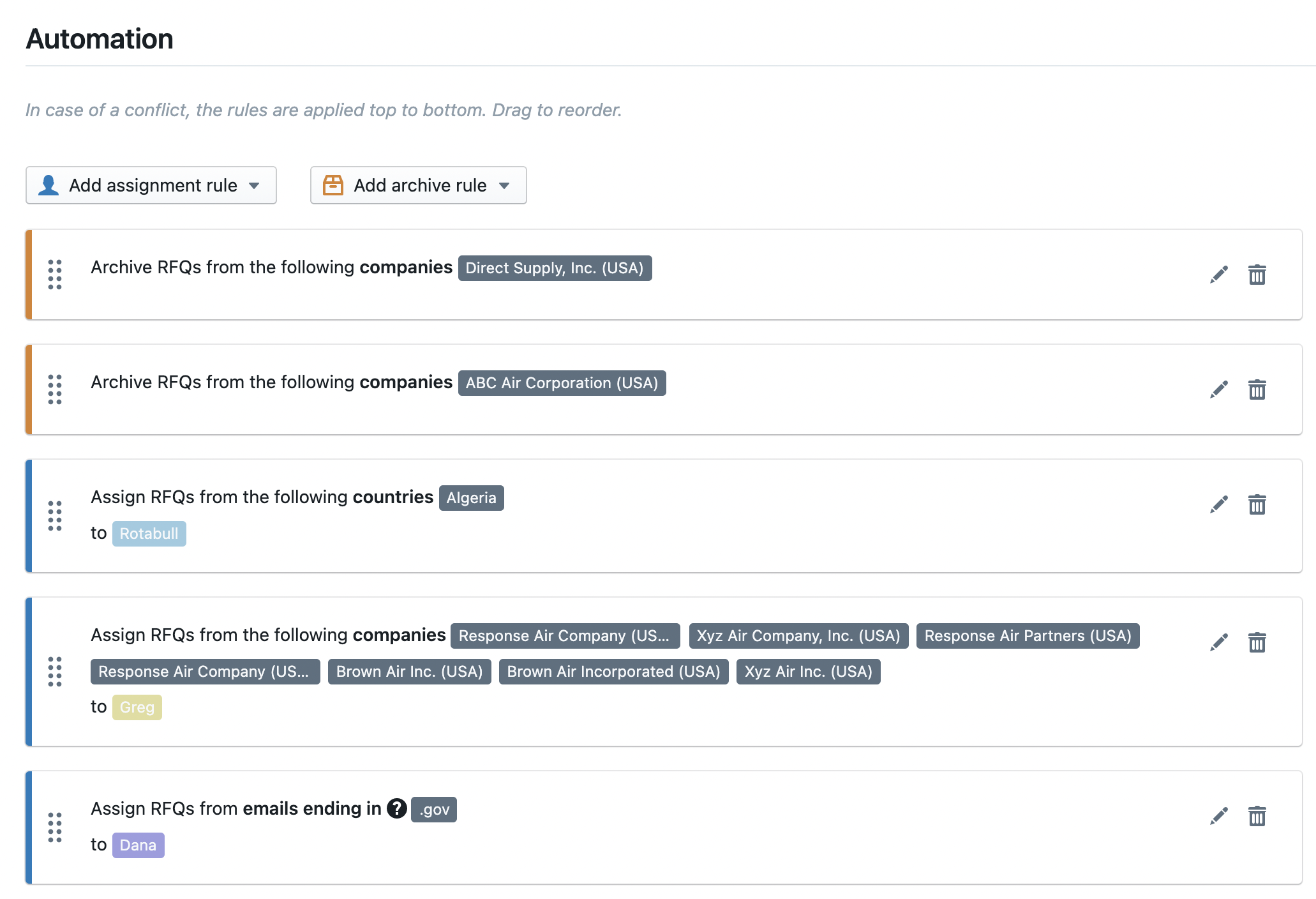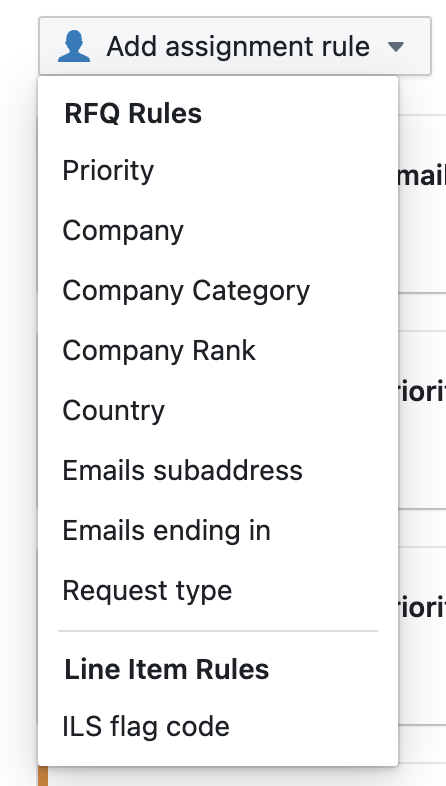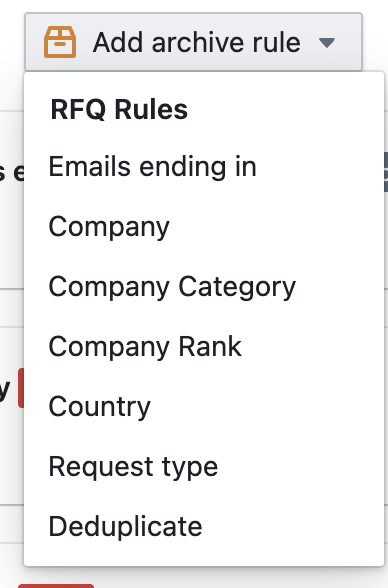Automation Rules
If you often find yourself manually assigning RFQs to team members during the day, or have unique processes for specific customers, Rotabull can help automate that work. Automation rules let you apply logic to incoming RFQs. Set up a rule once, and then it runs in the background!
Admin-only featureThis feature is only available for Admin users.

Automation rules come in three different flavors:
- Assign: Always assign RFQs that meet certain criteria to a salesperson or team
- Archive: Always archive/ignore RFQs based on certain criteria
- Autoquote: Automatically send a quote in response to an RFQ
Assign
There are several options you can use to add an assignment rule:

- Company: Automatically assign RFQs based on the buyer's company.
- For example, assign RFQs from "Delta Airlines" to an account manager. Note: the companies you can select from when creating this rule are pulled from your linked ERP system. If you're not using an ERP, you'll be able to select any company you've previously received an RFQ from in Rotabull.
- Email address ending: Assign RFQs based on the customer's email domain.
- For example, assign RFQs coming from <any_address>@army.mil by adding a rule for "army.mil". You can also enter a full email address if you'd like the rule to apply to a specific email.
- Customer country: Assign RFQs based on the customer's country.
- For example, assign RFQs from "United States" to an authorized distributor for that country. Rotabull gets a customer's country from the company information that it processes on each RFQ.
- ILS flag code: Assign RFQs based on the ILS flag code. This option is unique to the ILS Marketplace. ILS can include flag codes on RFQs that are sent from their site. Associated with the ERP stock line.
- Priority: Assign RFQs based on priority score. Priority level is set by the customer on the RFQ. In Rotabull, a priority of 1 is lowest and is considered "Routine", a priority of 2 is "Expedite", and a priority of 3 is highest "Aircraft on Ground".
- Company Category: Assign RFQs based on the customer company's category. The categories you can select from are pulled from your linked ERP system. If you don't have company categories in your ERP, or if you don't have an ERP system linked with Rotabull, you won't see any options here.
- Company Rank: Assign RFQs based on the customer company's rank (high-priority customer vs standard customer). Company rank information is pulled from a connected ERP system. If you don't have companies ranked in your ERP, or if you aren't using an ERP, you won't see any options here.
- Emails Subaddress: Assign RFQs by adding a subaddress to the in-bound Rotabull email address the RFQ was sent to. This allows for more complex assignment, such as auto-assigning email RFQs to the salesperson that forwarded it. Add a sub address in the field, ie "[email protected]" and choose your assignment. Then any RFQs sent to "[email protected]" will be assigned via this rule.
- Request Type: Assign RFQs based on whether they are a sale or repair.
Archive
An archive rule moves matching RFQs to the Archived view immediately, skipping the inbox. Or, you can automatically No Quote them. They are still searchable. This is similar to a customer blocklist.
You can add an archive rule based on:

- Company: Archive RFQs that come from a specific company. If you have linked an ERP system with Rotabull, you'll be able to select from the companies on your ERP. If you're not using an ERP, you'll be able to select from any companies that have previously sent you an RFQ in Rotabull.
- Country : Select this option to automatically archive RFQs sent from a particular country. This is the country associated with the company information that Rotabull processes on each RFQ.
- Emails ending in: Archive RFQs that come from a particular email domain. You can add any email suffix when creating the rule. You can also enter a full email address to block RFQs from a specific address.
- Company Category: Archive RFQs based on company category. The categories you can select from are pulled from your linked ERP system. If you don't have company categories in your ERP, or if you don't have an ERP system connected to Rotabull, you won't see any options here.
- Company Rank: Archive RFQs based on the customer company's rank (high-priority customer vs standard customer). Company rank information is pulled from a connected ERP system. If you don't have companies ranked in your ERP, or if you aren't using an ERP, you won't see any options here.
- Request Type: Automatically archive RFQs that are of type Sale (parts sale) or Repair.
- Deduplicate: A Deduplicate rule will apply to any RFQs that are duplicates of an existing RFQ in Rotabull. You can choose to automatically Ignore (archive) or No Quote them. An RFQ will be considered a duplicate if it has matching Buyer Company Name, Request, and Source to another RFQ that was received within the last hour.
Add multiple options to a single automation ruleFor most of the rule options described above, you can add multiple criteria. For example, you can make one automation rule that assigns RFQs from several countries to a team or user. Just select multiple countries when creating the rule. In cases where you need to enter text (such as an "Email address ending in" rule), separate multiple options with a comma.
Rule precedenceIn case of a conflict, the rules are applied from top (first) to bottom (last). Only one rule can apply to an RFQ. You can drag to reorder.
Autoquote
Read more about autoquote rules here .
Updated 6 months ago
